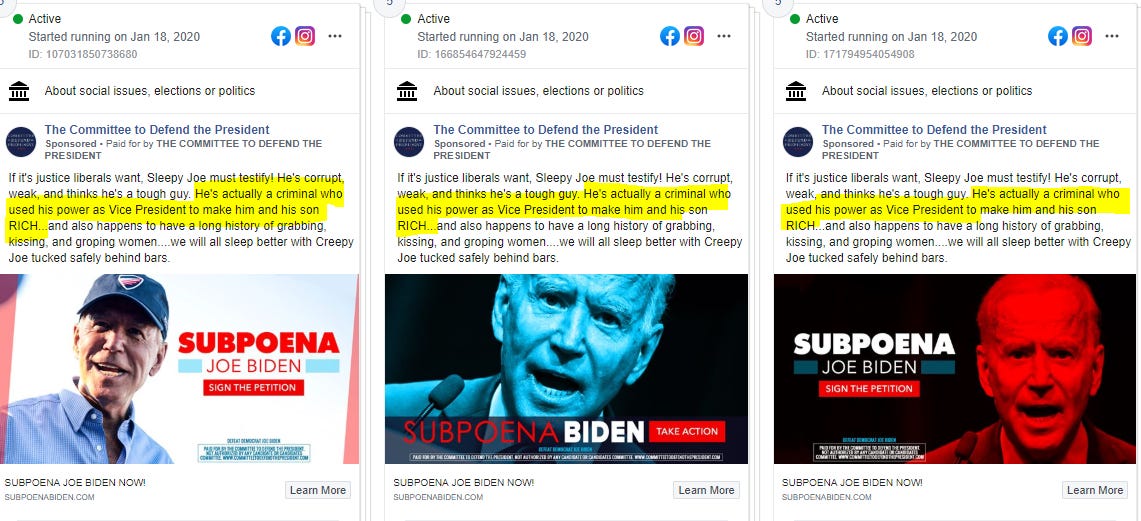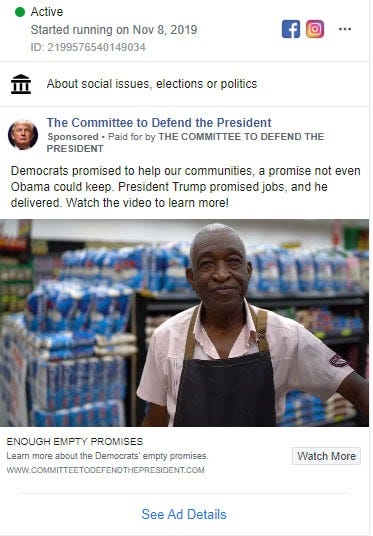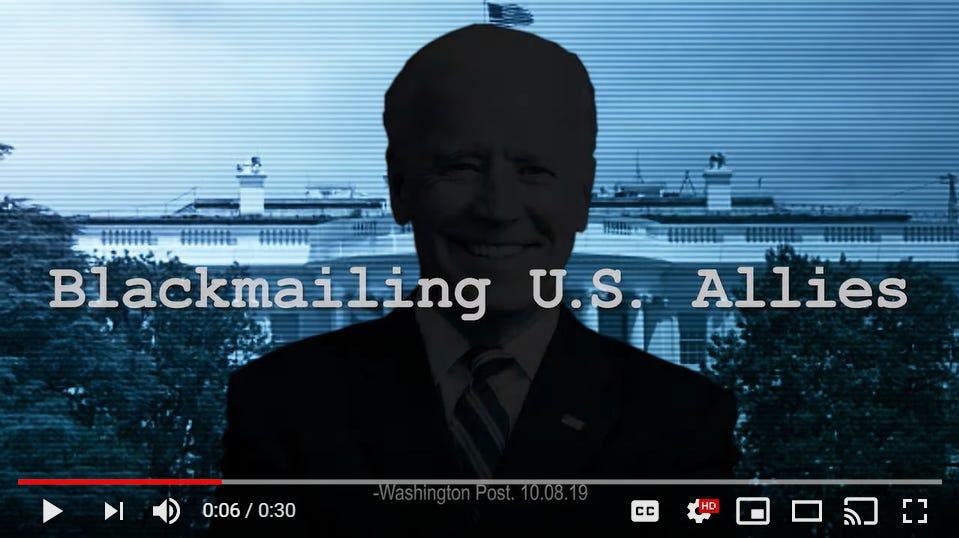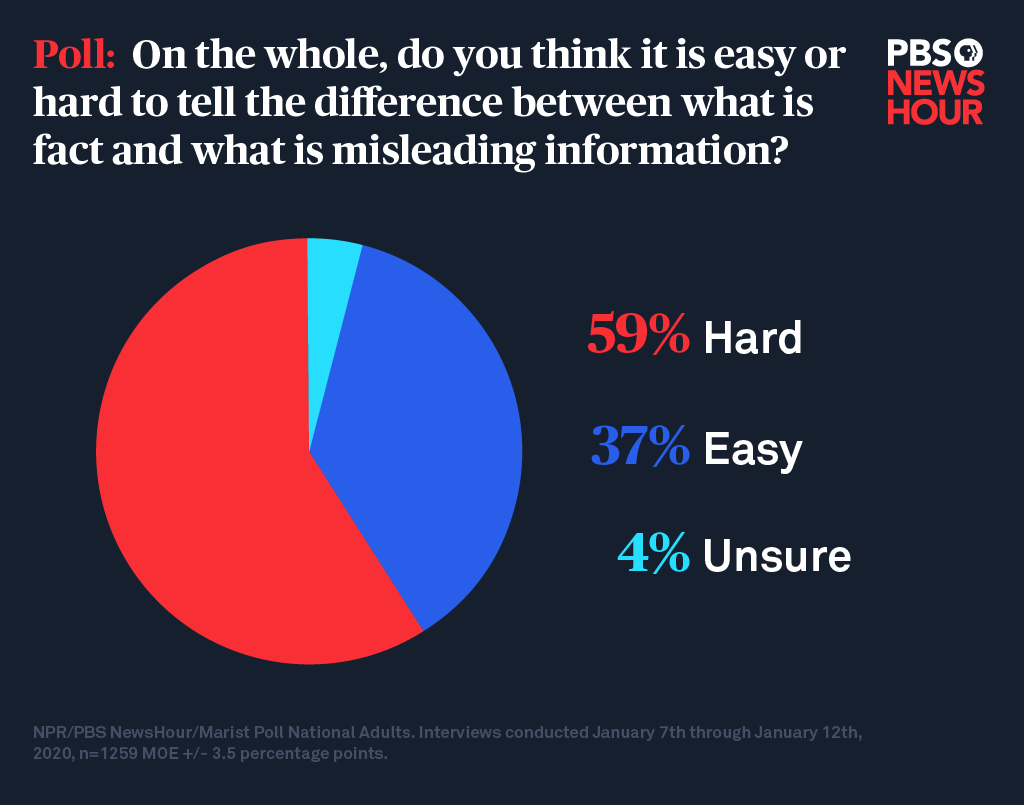Facebook allows pro-Trump Super PAC to lie in ads
This is the online version of the Popular Information newsletter. Sign up to get accountability journalism in your inbox:
Facebook has taken a lot of criticism, including from its employees, for its policy to allow politicians and political parties to lie in ads. It's a policy that puts Facebook in a position to directly profit from political misinformation. And it gives the green light to the Trump campaign to mislead the public.
But the policy only applies to political candidates and political parties. By the terms of the policy, therefore, most accounts that run political ads still cannot include claims debunked by Facebook's third-party fact checkers.

Facebook's policies specifically state that "organizations like Super PACs or advocacy organizations that are unaffiliated with candidates" are subject to fact-checking.
But Facebook is allowing a major pro-Trump Super PAC, the Committee to Defend the President, to run ads with lies. The Committee to Defend the President, according to the Center for Responsive Politics, is one of the "two biggest non-party outside spenders of this cycle."
Since Saturday, the Committee to Defend the President is running multiple ads that claim former Vice President Joe Biden is "a criminal who used his power as Vice President to make him and his son RICH."

This claim is false, according to Facebook's own fact-checking partners. PolitiFact, which is part of Facebook's fact-checking program, wrote in September that "Hunter Biden did do work in Ukraine, but we found nothing to suggest Vice President Biden acted to help him." Another Facebook fact-checking partner, FactCheck.org, named Trump's suggestion that Biden did anything improper with respect to Ukraine one of its "Whoppers of the Year."
In response to an inquiry about the Biden ads by the Committee to Defend the President, a Facebook spokesperson said it was entirely up to its fact-checking partners whether to evaluate the ad. And, thus far, none of them have chosen to do so. The fact that the ads contain a claim already debunked by its fact-checking partners does not matter. Facebook will only remove these ads if one of its fact-checking partners independently reviews them.
The Committee to Defend The President's history of deception
Over the last few months, the Committee to Defend the President has repeatedly used Facebook to advertise false claims. In November, Popular Information exposed how the Super PAC grossly misrepresented a clip from an Obama audiobook in an ad designed to drum up African-American support for Trump.

The ad was egregiously dishonest:
The ad features former President Barack Obama saying the following: "A plantation. Black people in the worst jobs. The worst housing. Police brutality rampant. But when the so-called black committeemen came around election time, we'd all line up and vote the straight Democratic ticket. Sell our souls for a Christmas turkey."
While it is Obama speaking, those aren't his words or his views. Rather, the ad dishonestly uses a clip for the audiobook of Obama's autobiography. In the book, Obama quotes the views of a barber named Smitty. In the book, Obama goes on to state that he believes in "the power of African-Americans to shape their political destiny when they are unified."
After the ad was flagged by Popular Information, it was fact-checked by PolitiFact, which rated it "Pants on Fire."

"The pro-Trump ad uses the passage to create the impression that Obama believed that black voters, ignored and suffering, sold their soul to the Democrats at election time. But the actual book passage is about the good things that come from voting," PolitiFact wrote.
That wasn't the first issue for the Committee to Defend the President. Last year, over a period of months, it ran Facebook ads that harvested voter information by telling users that their voter registration was incomplete. Facebook took the ads down after being contacted by the Washington Post.
In October, the Committee to Defend the President ran ads falsely claiming "accused former Vice President Joseph R. Biden Jr. of blackmailing Ukrainian officials to stop an investigation of his son." The Biden campaign wrote a letter to Facebook objecting to the ad. Katie Harbath, a former Republican operative who now is Facebook's head of global campaigns, responded that the issue was moot since the ad was inactive by the time that the Biden campaign noticed it.
According to Facebook's policy, "Advertisers that repeatedly post information deemed to be false may have restrictions placed on their ability to advertise on Facebook." But despite repeated infractions, there is no indication that any restrictions have been placed on the Committee to Defend the President's ability to advertise.
The Committee to Defend the President has also used Google to spread misinformation. In October, it promoted a YouTube video that falsely accused Biden of "blackmailing U.S. allies for political gain."

Google has limited microtargeting of political ads but has failed to take any meaningful steps against political ads with misinformation. Google has avoided some scrutiny by being less direct than Facebook about its willingness to run ads with lies. But the practical impact has been the same.
Facebook's dysfunctional approach
Facebook's approach to political misinformation in ads placed by Super PACs and other third parties is not working.
There does not appear to be any effort to prevent false ads from running on Facebook. If someone flags an ad as false after publication, Facebook will make it available for review by a fact-checker. But this process is far too slow. For example, Popular Information identified the Committee to Defend The President's November 8 ad about Obama on the day it began running and flagged it for PolitiFact immediately. Politifact started working on it right away and published its debunk on November 12. By that time, the ad had already stopped running.
The limits of "public scrutiny"
With respect to ads placed by candidates and parties, Facebook recently reaffirmed its decision to allow lies. "We have based ours on the principle that people should be able to hear from those who wish to lead them, warts and all, and that what they say should be scrutinized and debated in public," Rob Leathern, Facebook’s director of product management, wrote.
But much of the public, according to a recent survey, feel ill-equipped to sift through the torrent of information from social media. A poll "from PBS NewsHour, NPR and Marist Poll found that 59 percent of Americans say it is hard to identify false information — intentionally misleading and inaccurate stories portrayed as truth — on social media."

This makes particular sense with respect to ads from political candidates. The Trump campaign, for example, is currently running around 3500 Facebook ads. The idea that each of those ads will be "scrutinized" and "debated in public" seems like a fantasy.
Thanks for reading!



My God! Every one of the false ads takes things Trump is actually doing & projects it onto Biden! Every one! (I know this isn’t new but for some reason it constantly astonishes me)
My daughter's 21 year old Native American friend has been put in FB time out twice for calling some loud mouth racist a "Cracker." He reported her. Judd maybe we should start a complaint campaign on these lying ads funded by the 1%.
Oh wait. Won't work. The FB weasels are earning millions. The old Sheepoles are getting bombarded.
Alternate Facts rule in a Presidency where he has told over 14,000 lies. It is a worrisome world that gets worse by the day.
Thanks for the investigations.